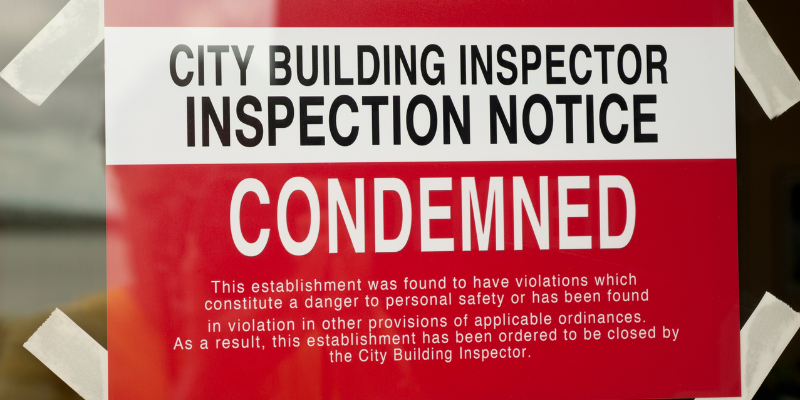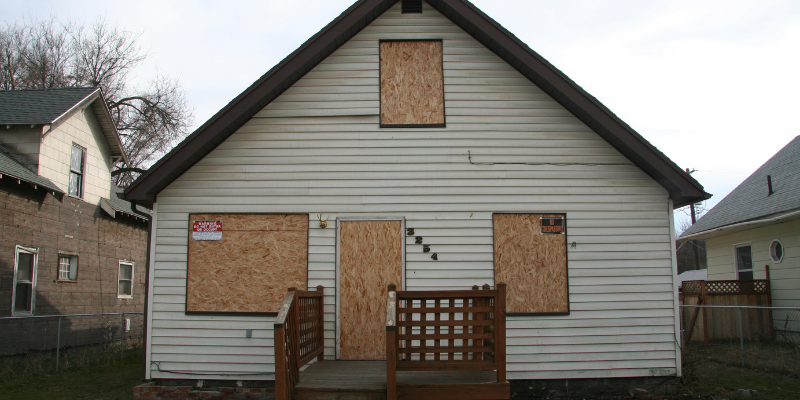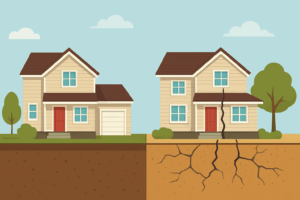
Understanding House Condemnation and Its Implications
Selling a condemned house can be daunting, but understanding how to navigate the process can help property owners sell their house fast. Let’s break down what it means for a house to be condemned and why it happens.
What Does It Mean for a House to Be Condemned?
When a house is condemned, it’s officially declared unfit for living by local government body. This decision isn’t made lightly and typically arises from severe safety or health concerns. A condemned house can’t be legally inhabited until significant issues are resolved.
Common Reasons for Condemnation
Several factors can lead to a home being condemned:
- Structural Damage: Major issues like foundation problems or a collapsing roof.
- Health Risks: Presence of black mold, infestations, or unsanitary conditions.
- Hazards: Fire damage, toxic substances, or previous drug use.
- Utilities Issues: Lack of essential utilities such as water, electricity, or gas.
Overview of the Legal Process Involved in Condemnation
The property condemnation process involves several steps:
- Inspection: Local government authorities inspect the property based on complaints or routine checks.
- Notification: Homeowners receive an official notice detailing violations and required actions.
- Deadline fos: A timeline is given for making necessary repairs to lift the condemnation.
- Hearing: If repairs aren’t made, legal hearings determine the next steps.
- Evacuation Order: Non-compliance results in an evacuation order and potential demolition.
Understanding these aspects helps you navigate the complexities of selling your condemned building. However, if you’re facing foreclosure due to these circumstances, it’s crucial to explore available options. We provide essential resources for understanding and preventing foreclosure in Texas, helping you learn how to stop the foreclosure process and avoid losing your home. Knowing the reasons behind condemnation and the legal implications prepares you for the journey ahead.
Selling Options for Condemned Homes
1. Selling the Property As-Is
Selling a condemned house in its current state, or as-is condition, can be a smart move for many homeowners. This approach means you won’t have to repair the house or clean up the property before selling.
Benefits of Selling As-Is:
- Simplicity: Avoid the hassle of making extensive and costly repairs.
- Speed: The sale process can be much quicker, often closing within days to a few weeks.
- Convenience: Cash property buyers are usually willing to purchase properties despite repairs, making it easy for you to move on.
How Cash Home Buyers Operate: Cash home buyers or a home buying company specialize in purchasing homes in their current condition. They:
- Evaluate the property and make an offer based on its current condition.
- Typically close deals quick since they do not rely on mortgage approvals.
- Cover most, if not all, closing costs, simplifying the transaction for you.
Selling your condemned house in it’s existing condition can save time and stress, especially when facing a tight timeline or financial constraints.

Why Sell Your House To TX Cash Home Buyers?
1. You Pay Zero Fees
2. Close Quickly or the date of your choice
3. Guaranteed Offer
4. No repairs required, we buy as is
5. Less Hassles!
Call Now (281) 595-7550 Send Text
2. Making Repairs and Renovations
Another option is repairing condemned real estate to meet local building codes and lift the condemnation status. This route involves several critical steps:
Types of Repairs Needed:
- Structural Repairs: Fixing foundation issues, roof damage, or significant structural problems.
- Health and Safety Improvements: Removing hazardous materials like black mold or asbestos.
- Utility Restoration: Ensuring plumbing, electrical systems, and heating are functional and up to code.
However, it’s crucial to be aware of potential legal implications when selling a house with undisclosed defects. Failure to disclose defects can lead to serious consequences for sellers.
Steps to Repair and Sell a Condemned House:
- Assessment: Hire a professional inspector to identify all code violations and necessary repairs.
- Permits: Obtain the required permits from local government agencies to commence work.
- Repairs: Complete the necessary renovations with licensed contractors if needed.
- Inspections: Schedule follow-up inspections to ensure all work complies with local codes.
- Certification: Acquire a Certificate of Occupancy once your house meets all requirements.
Repairing a condemned house can significantly increase its market value but requires careful planning and investment.
3. Exploring Other Ways To Sell
If you’re considering different avenues beyond selling with the current condition or making repairs, there are several alternatives:
For Sale By Owner (FSBO): Selling your home without an agent allows you to:
- Avoid paying real estate commissions.
- Directly negotiate with buyers.
- Have full control over the selling process.
- Set your own schedule for showings and open houses.
- Potentially save money on closing costs.
Real Estate Agents: Working with a real estate agent can:
- Provide professional marketing strategies.
- Access a broader pool of potential buyers.
- Handle negotiations and paperwork efficiently.
- Offer expertise in pricing the property competitively.
- Guide through the legal and regulatory requirements.
Legal Considerations in Selling Condemned Properties

Selling a condemned house means navigating through various local government regulations. These regulations dictate the specific steps required to address code violations and make the property legally sellable. Each jurisdiction has its own set of rules, so it’s crucial to understand the local building codes and health and safety standards. For instance, in Texas, there are stringent rules that must be adhered to before a condemned building can be sold or even repaired.
Local Government Regulations
- Code Violations: Condemned houses generally have several code violations that need rectification. These might include structural issues, health hazards like mold, or safety risks.
- Permits & Inspections: Any repair work undertaken requires proper permits and inspections. This ensures compliance with local laws.
- Legal Hearings: The condemnation process often involves legal hearings where the homeowner can present their case. Ignoring these can result in penalties or forced demolition.
Eminent Domain
Eminent domain is a pivotal concept when discussing condemned real estate. It allows the government to take private property for public use, provided they offer fair compensation. If your condemned house is subject to eminent domain:
- Compensation: The government must provide “just compensation,” which usually reflects the market value of the property.
- Pro-Tanto Award: In some cases, partial payment (pro-tanto award) may be given initially, with additional compensation following later.
Understanding condemnation laws in Texas and the role of eminent domain can help you better navigate the complexities of selling an abandoned property. Each situation is unique, requiring tailored advice from legal experts familiar with local regulations.
Other Articles You Might Enjoy:
- Why Days on Market Matters More Than You Think When Selling for Cash
- Messy Title Problems in Texas: What Every Homeowner Needs to Know
- What Does It Mean to Get a Cash Offer from a Real Estate Investor?
- Selling a Problem Property? Here’s the Fastest Way
- The Benefits of Selling a Hoarder Home As-Is in Texas
Finding Buyers for Condemned Properties
Characteristics and Advantages of Cash Buyers
Cash buyers offer a unique advantage when it comes to selling a condemned or abandoned house. Here are some key characteristics:
- Speed: Cash transactions are fast, often closing in days rather than weeks or months.
- No Need for Repairs: Cash buyers purchase properties as they are saving you the cost and hassle of making repairs.
- No Financing Contingencies: No waiting for mortgage approvals or dealing with financing falling through.
- Simplicity: The paperwork is usually straightforward, reducing the complexity of the sale.
These benefits make cash buyers an attractive option for homeowners looking to sell a condemned property quickly and without additional stress. In fact, cash buyers are often great leads for real estate agents, making them a valuable resource in the selling process.
How to Effectively Reach Out to Potential Cash Buyers
Connecting with potential cash buyers or investors requires targeted strategies:
- Online Platforms: Websites like Craigslist, Zillow, and Facebook Marketplace allow you to list your property directly to interested parties.
- Real Estate Investment GroupsLocal real estate clubs or investment groups can be excellent places to find cash buyers who are willing to purchase properties with condemned status.
- Direct Mail Campaigns: Send postcards or letters detailing your property’s condition and your willingness to sell without repairs.
- Real Estate Agents Specializing in Distressed Properties: Some agents focus on distressed or condemned real estate and have established networks of cash buyers.
- Networking Events: Attend local real estate and investor meetups to connect with potential buyers face-to-face.
By leveraging these methods, including utilizing online platforms and networking events, you can increase your chances of finding the right buyer for your condemned house quickly and efficiently.
Challenges in Selling Condemned Houses

Selling a condemned house isn’t easy. Homeowners often face many challenges that can make the process overwhelming.
Common Challenges
1. Code Violations
- Condemned or unsafe properties often have numerous code violations. These can range from structural issues to health and safety hazards.
- Addressing these violations is essential if you plan to sell the house, but it can be costly and time-consuming.
2. Navigating Legal Issues
- Understanding and complying with local laws regarding condemned homes is crucial. Different areas have different regulations, such as in Texas where specific guidelines apply when trying to sell a condemned house, which can lead to legal complications if not followed.
- Consulting with an attorney or real estate expert can help you navigate these complexities.
3. Finding Buyers
- Attracting potential buyers for a dilapidated property is challenging due to its condition. Many traditional buyers are reluctant to invest in such homes.
- Cash buyers and real estate investors are usually more interested in buying condemned properties, but they often offer less than market value. In some cases, homeowners choose to sell their condemned houses as-is, avoiding the hassle of extensive repairs and legal hurdles.
4. Financial Constraints
- The cost of repairs can be prohibitive, especially if you need to address major structural issues or health hazards like mold or asbestos.
- Deciding whether to invest in repairs or sell as-is requires careful consideration of your financial situation.
5. Stress and Time
The process of selling a condemned house can be stressful and time-consuming. Dealing with inspections, permits, and negotiations adds layers of complexity.
These challenges highlight why many homeowners opt for solutions like selling their abandoned property for cash, which can provide a quicker and less stressful alternative to traditional selling methods.
Conclusion: Can You Sell a Condemned House?
Selling a condemned house can seem daunting, but it’s entirely possible. Each homeowner’s situation is unique, and there are multiple paths to consider when deciding to sell your house, especially if it has a condemned status.
- Sell As-Is: Quick, hassle-free, and to cash buyers.
- Make Repairs: Lift the condemnation and increase property value.
- Explore Other Options: FSBO, real estate agents, or a direct cash buyer.
Remember, understanding your circumstances and weighing your options carefully is crucial. Whether you opt for repairs or a quick sale, knowing how to sell a condemned house can turn a challenging situation into an opportunity.
FAQs (Frequently Asked Questions)

What does it mean for a house to be condemned?
A house is considered condemned when it is deemed uninhabitable due to severe issues such as structural damage or health risks. This designation indicates that the property does not meet safety standards and may pose a threat to occupants.
Can I sell a condemned house as-is?
Yes, you can sell a condemned house in its current condition without making any repairs. Selling as-is is often quicker and more convenient, especially when working with cash home buyers who are experienced in purchasing properties that require significant work.
What are the common reasons for a house to be condemned?
Common reasons for condemnation include structural damage, such as severe foundation issues, health risks from mold or hazardous materials, and failure to meet building codes. These factors can make the property unsafe for occupancy.
What steps should I take to repair and sell a condemned house?
To repair and sell a condemned house, you should first identify and address code violations. Obtain necessary permits and inspections before beginning repairs. Once the property meets local safety standards, you can list it for sale through real estate agents or investors.
What legal considerations should I be aware of when selling a condemned property?
When selling a condemned property, it’s important to understand local condemnation laws and regulations. Additionally, if your property is affected by eminent domain, you may need to consider compensation options offered by the government for your property.
What challenges might I face when trying to sell a condemned house?
Homeowners often face challenges such as navigating legal issues related to code violations and finding qualified buyers willing to purchase properties with condemnation status. These obstacles can complicate the selling process significantly.
Disclaimer:
The content provided on this blog is for informational purposes only. We are not attorneys or tax professionals. For personalized legal or tax advice, please consult with a qualified professional.
Written by Lisa Martinez, Founder of TX Cash Home Buyers

About The Company
TX Cash Home Buyers helps Texas homeowners sell quickly and simply — even in tough situations like repairs, inherited homes, or financial stress. Founded by Lisa Martinez, we’re known for our local experience, fair offers, and commitment to guiding sellers through off-market sales with clarity and care.




